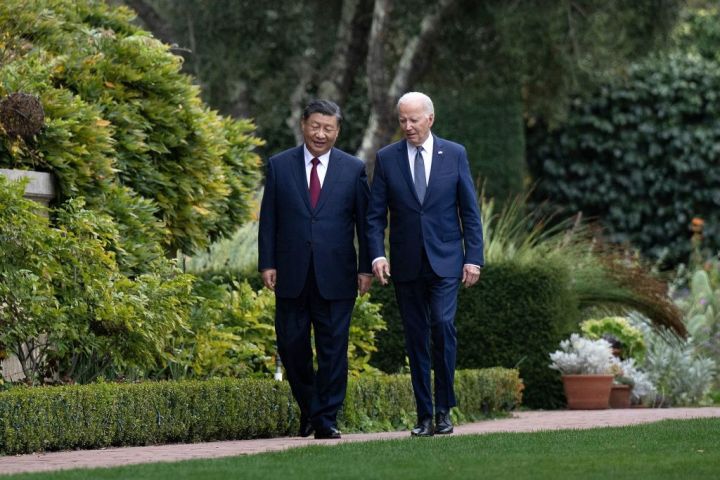
After their big meeting, Biden and Xi are still at odds over Taiwan
Share Now on:
After their big meeting, Biden and Xi are still at odds over Taiwan

Opening the communication lines. Chinese President Xi Jinping and President Joe Biden met this week in San Francisco to de-escalate tension between the world’s two biggest economies after more than a year of ghosting each other.
At odds over Taiwan. The four-hour meeting between Biden and Xi reopened communication lines but made little progress on much else, especially on the status of Taiwan. The island split from China after communists took over the mainland in 1949 and now operates as an autonomous democracy. The U.S. has sold weapons and provided other military assistance to help Taiwan strengthen its self-defense, much to the displeasure of China. Beijing considers the island’s reunification with the mainland nonnegotiable.
During their meeting, Xi told Biden that Taiwan was the biggest, most dangerous issue in U.S-China ties. While the U.S. does not have official diplomatic relations with Taiwan, Biden has signaled that the U.S. would help defend the island if it came under attack.
Why does Taiwan matter? It’s economically important to the U.S. and the world. The waters around Taiwan are some of the busiest shipping lanes in the world. And it’s a leader in manufacturing textiles, laptops, motherboards and crucially, more than 60% of the world’s semiconductors.
A war over the island, one semiconductor executive said, would cause such severe disruptions to the global chip supply that it would “bring the world to its knees.” Xi wants Taiwan annexed by 2027, but some U.S. officials believe conflict could come sooner.
How did we get here? China cut off communication with the U.S. after former House Speaker Nancy Pelosi visited Taiwan last year. Relations also weren’t helped after the U.S. military shot down several suspected Chinese spy balloons in U.S. airspace. Despite tensions and trade wars, the two countries’ economies are still very much intertwined.
Smart in a shot

“The Marvels,” the 33rd film for the Marvel Cinematic Universe and the sequel to 2018’s billion-dollar “Captain Marvel,” earned just $47 million in its U.S. opening weekend. Early box office tracking was already far below “Captain Marvel’s” opening weekend, and “The Marvels” fell far below that. It’s the studio’s first true flop. What or who is to blame? “Adolescent fanboy hate”? The SAG-AFTRA strike? Middling reviews?
Film critic A.A. Dowd argued the MCU might just come with too much homework. The other two leads of “The Marvels” started out as TV characters on Disney+, a streaming service that just got more expensive.
But it’s not just the MCU. Rival DC’s cape films have stumbled so far this year ahead of a big reboot in 2025. “The Marvels” flop is part of a larger recent trend too: Once thought to be the main draw for movie theaters, action and adventure flicks just aren’t cutting it anymore.
The Numbers
America’s favorite sedan will soon be available exclusively as a hybrid. Let’s do the numbers.
2025
The redesigned 2025 model of the Camry will be hybrid only. While Toyota doubles down on hybrid powertrains, most American automakers are more focused on all-electric vehicles.
$1,500
A consumer pays a $1,500 to $2,000 premium to buy a hybrid compared to a gas-powered vehicle. The federal government estimates a hybrid also ends up saving consumers $650 per year in fuel costs.
$15,350
When Kelley Blue Book compared the medium-term cost of a hybrid versus an all-electric car, the hybrid was a better buy, amounting to $15,350 in savings over five years. That’s mainly due to the rapid depreciation of EVs.
$7,500
In January, EV buyers will get an instant rebate of $7,500 when they purchase a new electric vehicle. That means buyers won’t have to wait to file their tax return to see savings and will help buyers borrow less.
None of us is as smart as all of us
Tell us what’s making you smarter at smarter@marketplace.org. We’d love to include your recommendation in a future newsletter.
Envoys of friendship: Panda diplomacy is still a thing. Producer Rosie Hughes is reading an Associated Press article about the possibility that China will send new giant pandas to the U.S.
Charging 29.99% interest: Producer Nic Perez is reading an article from Bloomberg about lenders selling investors repackaged subprime car loans (gift link) whose yields beat Treasurys. It doesn’t make sense for the nearly 100% of borrowers who are projected to default, but as one lender said, “it works for everyone else.”
Turkeyed out: Editor Carrie Barber is reading a People magazine article about why Martha Stewart is canceling Thanksgiving dinner. If Martha can reevaluate how she wants to spend her holiday, so can you.
There’s a lot happening in the world. Through it all, Marketplace is here for you.
You rely on Marketplace to break down the world’s events and tell you how it affects you in a fact-based, approachable way. We rely on your financial support to keep making that possible.
Your donation today powers the independent journalism that you rely on. For just $5/month, you can help sustain Marketplace so we can keep reporting on the things that matter to you.

















